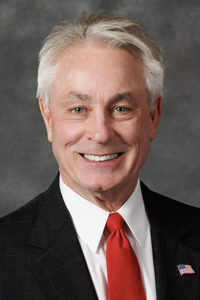Religious protections for school employees proposed
Nebraska school employees could express their religious beliefs while at work without punishment under a bill considered Feb. 12 by the Education Committee.

LB1034, introduced by Central City Sen. Loren Lippincott, seeks to prevent school districts from punishing employees for engaging in private religious expression while on duty at a school.
Under the bill, staff could engage in private religious expressions such as prayer, religious discussion or study with other employees during non-instruction time. Staff also could sponsor a student religious club or organization and assist students in planning meetings, activities and events.
Additionally, LB1034 would allow school employees to wear religious clothing, symbols or jewelry at work, as long as such items comply with the school’s dress code, and decorate desks or personal spaces with religious objects.
Lippincott said he introduced the bill in response to the 2022 U.S. Supreme Court ruling in Kennedy v. Bremerton School District, which was decided in favor of Joseph Kennedy, a former football coach in Bremerton, Washington.
Kennedy sued the public school district for placing him on administrative leave after defying directives to stop leading his team in mid-field prayers immediately after games. The Supreme Court ruled that the First Amendment protected Kennedy’s conduct. Lippincott said passing LB1034 into state law would align Nebraska law with the Supreme Court’s ruling.
“I want to make sure that we have our rights spelled out so that this does not happen again — or happen in our state,” he said.
Testifying in support of the measure was Nate Grasz, speaking on behalf of the Nebraska Family Alliance. He said the current lack of clarity for school districts regarding religious freedom could lead to restrictions on speech and religious expression for public school employees.
LB1034 makes clear that a school district retains the ability to maintain order and discipline on school grounds, Grasz said, and protects the rights of students, employees and visitors.
“This [bill] is about private religious expression that is noncoercive and protected by the First Amendment,” he said.
Marion Miner also testified in support of the measure on behalf of the Nebraska Catholic Conference. In recent years, he said, religious liberty has been interpreted as specifically the freedom to worship, which is a “narrow, mistaken view.”
“Religious liberty must entail the ability to live out one’s faith in day-to-day life activities,” Miner said.
Abbi Swatsworth, speaking on behalf of OutNebraska, testified in opposition to the proposal. While the First Amendment protects freedom of religion, she said, it also protects freedom from religion. She also warned that allowing school staff to practice their faith at school openly could harm LGBTQ students.
“We’ve heard directly from too many students across the state that their school bullies are not other students — but instead, teachers and administrators who refuse on religious grounds to honor their identities,” Swatsworth said.
Joy Kathurima, representing ACLU Nebraska, also testified against LB1034, saying the proposal would allow school staff to impose prayer on students or “proselytize” to them unconstitutionally. Kathurima said the Supreme Court made clear in its ruling in the Kennedy case that limitations remain in place on religious activity by school employees while on duty or interacting with students.
The committee took no immediate action on the bill.

